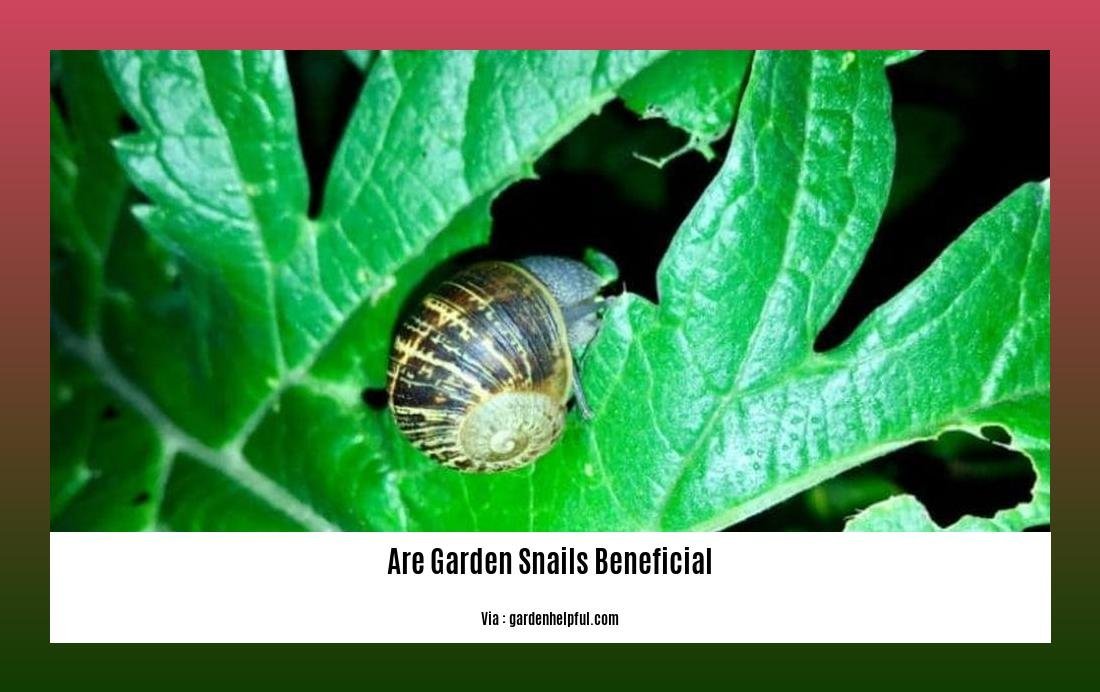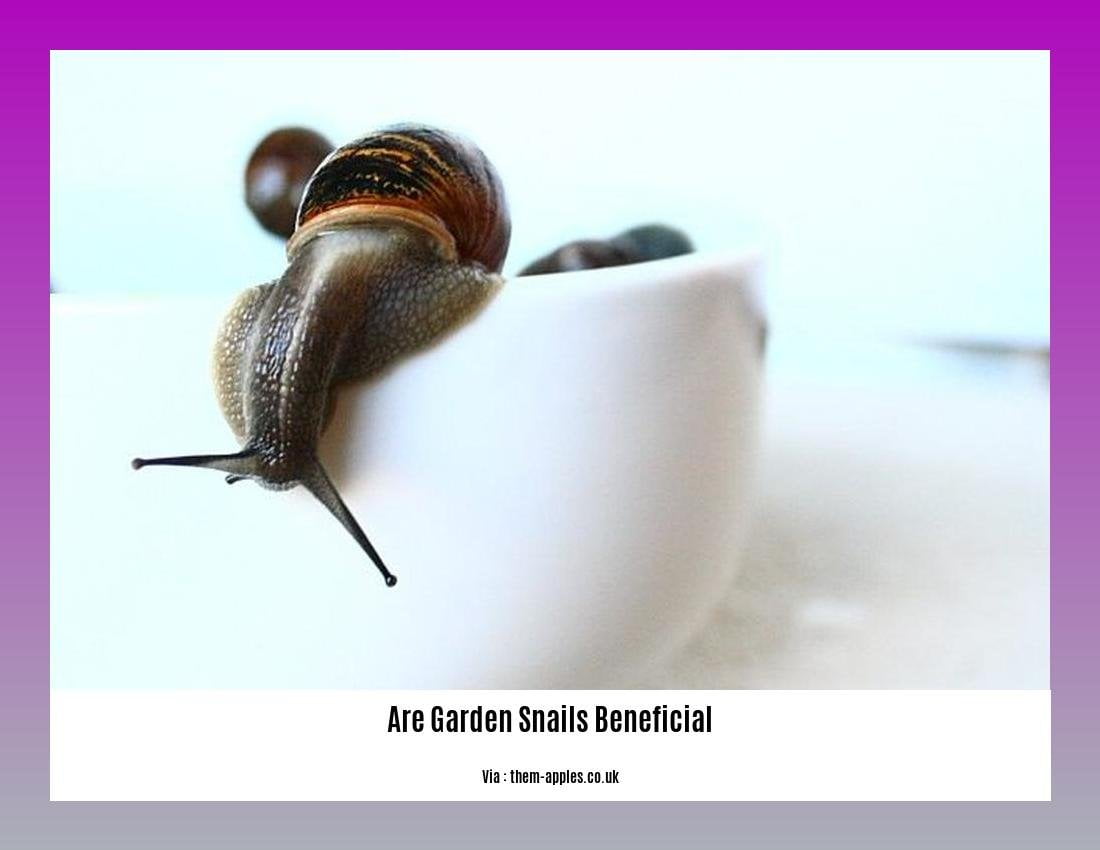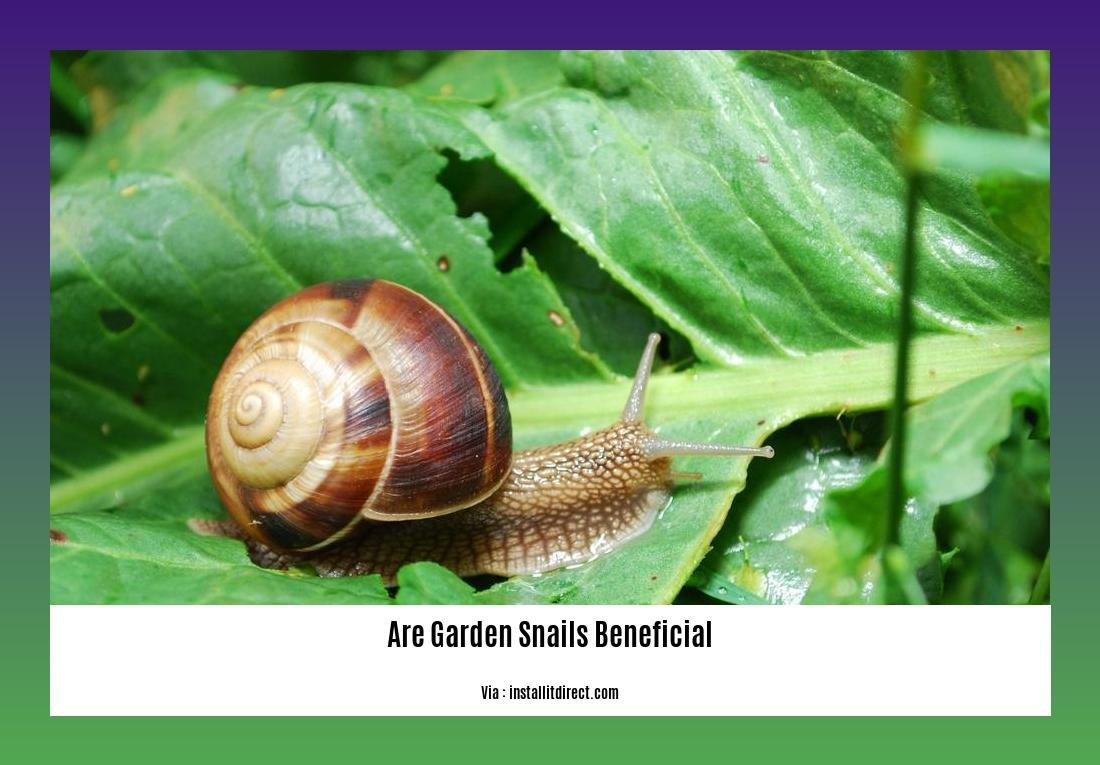Unveiling the Hidden Benefits: Are Garden Snails Beneficial to Your Green Spaces? Garden snails may often be dismissed as pests, their slimy trails evoking frustration and annoyance among many gardeners. However, beneath their small and seemingly insignificant exterior lies a captivating story of symbiosis and ecological harmony. As we delve into the world of these often-maligned creatures, we will uncover the hidden benefits they bring to our green spaces. From nurturing soil health to supporting biodiversity, garden snails play a vital role in enhancing the overall wellbeing of garden ecosystems. Get ready to embark on a journey where we shed light on the untold advantages that these humble creatures offer.
Key Takeaways:
- Snails contribute to nutrient cycling and soil enrichment by consuming dead plant material and organic debris in the garden.
- The presence of snails in the garden indicates a healthy and balanced ecosystem.
- Snails help recycle decaying plant matter in the garden.
- Decollate snails are natural predators of common garden snails and slugs, helping control their population.
- Providing hiding places such as rocks, logs, and thick vegetation can attract snails to the garden.
- Snails are not harmful to pets.
- Common brown snails and slugs feed on plants and vegetables, while decollate snails feed on brown snails and slugs.
- Prevention of snail invasion is recommended to prevent damage to plants and vegetables in the garden.
Are Garden Snails Beneficial?

Garden snails have long been viewed as a nuisance, wreaking havoc on our beloved plants and vegetables. But what if I told you that these slimy creatures actually have valuable roles to play in our green spaces? Yes, it’s true! Garden snails, when present in the right balance, can bring a myriad of benefits to our gardens. So, let’s delve into the fascinating world of garden snails and uncover the hidden advantages they offer.
The Great Soil Enrichers
Our gardens thrive when the soil is healthy and nutrient-rich. That’s where garden snails come in. These little mollusks play a vital role in the decomposition process, feasting on dead plant material and organic debris. As they munch away on decaying leaves and fallen flowers, they break down these components into smaller pieces, facilitating nutrient cycling. Ultimately, this results in improved soil fertility, making it easier for plants to absorb the essential elements they need to grow and thrive.
Indicators of Ecosystem Balance
Ever wondered if your garden ecosystem is in good shape? Well, the presence of garden snails can be a telltale sign. When we spot snails peacefully going about their business, it indicates a balanced and healthy ecosystem. These little creatures are part of a delicately woven web of life, which includes predators, beneficial insects, and a diverse range of flora. By embracing the diversity that garden snails bring, we can foster a harmonious environment where every organism has its rightful place.
Nature’s Recyclers
Imagine if there were no garden snails to take care of decaying plant matter. Our gardens would be cluttered with dead leaves, wilted flowers, and fallen fruit. Luckily, snails are experts in recycling this organic waste. They consume decaying plant material and transform it into valuable compost and humus, which in turn enriches the soil. In this way, garden snails contribute to sustainable gardening practices, aiding in the reduction of waste and making our gardens more self-sufficient.
Decollate Snails: The Natural Predators
When discussing garden snails, it’s essential to mention their counterparts – the decollate snails. These snails are natural predators of common brown snails and slugs, which are known to feast on our plants and vegetables. By introducing decollate snails into our gardens, we encourage a natural form of pest control. These beneficial snails help in regulating the population of their more destructive cousins, ensuring a healthier garden environment.
Creating Snail-Friendly Spaces
If you’re interested in attracting garden snails and reaping their benefits, it’s essential to create a favorable habitat for them. Provide hiding places such as rocks, logs, and dense vegetation. These nooks and crannies become cozy homes for snails, encouraging them to call your garden their own. By inviting snails into your space, you’ll establish a mutually beneficial relationship, where they contribute to the overall ecosystem health while enjoying a safe haven.
But Wait! Are They Harmful?
You might be concerned about the potential harm garden snails can cause to your pets. Rest assured, garden snails are not harmful to our furry friends. They do not pose any significant threat or carry diseases that could harm cats, dogs, or other domestic animals. However, it’s still essential to supervise your pets when they are outdoors, as snails can be tempting playthings for some animals.
Balancing Act: The Pros and Cons
While garden snails offer a plethora of benefits, it’s crucial to strike a balance. Common brown snails and slugs have a taste for our precious plants and vegetables, and their excessive population can wreak havoc on our garden beds. To prevent damage, it’s recommended to keep these snails out of our gardens. Implementing preventive measures, such as using barriers, introducing natural predators, or utilizing organic pest control methods, can help in managing snail populations without completely eliminating them.
In Conclusion
As we’ve discovered, garden snails are more than just slimy creatures roaming our gardens. They have an important role to play in maintaining soil health, promoting biodiversity, and enhancing the overall health of our garden ecosystems. By embracing the benefits they offer and finding ways to manage their presence, we can create thriving green spaces that are in harmony with nature. So, the next time you spot a garden snail, take a moment to appreciate its valuable contribution to the world beneath our feet.
Are you wondering if snails are good for your pond? Check out this article on the benefits of snails for your pond at are-snails-good-for-your-pond.
If you’re a dog owner in Australia, you might be concerned about whether snails are poisonous to dogs. Find out more about this topic at are-snails-poisonous-to-dogs-australia.
Curious about trapdoor snails and their role in maintaining a healthy pond environment? Discover why trapdoor snails are good for your pond by clicking on are-trapdoor-snails-good-for-pond.
Pondering whether turtles are bad for your pond? Learn more about the potential drawbacks of having turtles in your pond at are-turtles-bad-for-a-pond.
Impact of Garden Snails on Plant Growth and Protection

Garden snails, often viewed as pests, actually play a vital role in maintaining the health and balance of your green spaces. These intriguing creatures contribute to the decomposition process, enriching the soil and promoting plant growth. In this article, we will explore the hidden benefits of garden snails and their impact on plant growth and protection.
The Role of Garden Snails in the Ecosystem
Garden snails are nature’s recyclers, aiding in the transformation of decaying plant material and organic debris into valuable compost and humus. Their presence is an indicator of a healthy and balanced ecosystem. These tiny organisms primarily decompose dead leaves and flowers, which accelerates the recycling of plant nutrients. As they break down and recycle these materials, they contribute to nutrient cycling and soil enrichment, consequently improving soil fertility.
Garden Snails as Beneficial Creatures
Contrary to popular belief, garden snails are not entirely harmful to your green spaces. They play an important role in controlling plant pests, especially when it comes to weed growth. By eating leaves, flower petals, and other plant material, they help reduce the growth of unwanted plants, ultimately aiding in weed control.
Ensuring a Healthy Balance
Although garden snails offer benefits to your garden ecosystem, it is crucial to manage their population to prevent potential damage to your plants and vegetables. While they are beneficial, an overabundance of snails can lead to the consumption of valuable greenery.
To strike a balance, keep your garden clean and free of debris. Snails are attracted to cluttered habitats, so maintaining a tidy environment will discourage them from taking up residence. Consider using traps to capture these creatures before they cause significant damage to your beloved plants.
Key Takeaways:
- Garden snails contribute to the decomposition process, enriching the soil and promoting plant growth.
- Their presence indicates a healthy and balanced ecosystem.
- Snails help reduce weed growth and aid in controlling plant pests.
- Managing the snail population is essential to prevent potential damage to plants and vegetables.
Citations:
1. Off Grid Grandpa. “Benefits Of Snails In The Garden ( Top 7 Pros )”
2. Our Sweet Garden. “Garden Snails: Are They a Danger in Your Garden?”
Contribution of Garden Snails to Biodiversity and Ecological Balance
Snails may seem small and insignificant, but they play a vital role in maintaining the balance and functionality of ecosystems. These often overlooked creatures contribute in numerous ways to the biodiversity and ecological balance of our green spaces. In this article, we will explore how garden snails make a valuable contribution to our environment.
Food for Thought
Garden snails serve as an important food source for various animals, including mammals, birds, slow worms, earthworms, and insects. Their consumption by these creatures helps to maintain the natural food chain and ensures the survival of other species in the ecosystem[^1^].
Nature’s Recyclers
Snails contribute to the process of decomposition by feeding on decaying and dead vegetation. By breaking down organic matter, they promote nutrient cycling and enable the return of essential elements back into the ecosystem[^2^].
Nature’s Slowest Pollinators
Surprisingly, snails also act as pollinators. They assist in the movement of pollen between flowers, facilitating their reproduction and promoting plant species diversity within the ecosystem[^3^].
The Great Equalizers
While it may be frustrating when snails munch on our favorite garden plants, this process is actually a natural occurrence. Snails help regulate plant populations by selectively consuming certain species. This control prevents any single plant from dominating the ecosystem and allows for a more balanced and diverse plant community[^4^].
Spore Dispersers
Garden snails not only aid in the reproduction of flowering plants but also play a role in the reproduction of ferns and bryophytes. By assisting in the dispersal of spores, they contribute to the growth and proliferation of these non-flowering plants[^5^].
Habitat Quality Indicators
The abundance and diversity of land snails can serve as indicators of habitat quality. Research has shown that the total abundance and richness of snail communities accurately reflect the overall health and functionality of an ecosystem. Monitoring and studying snails in their respective habitats can provide valuable insights into the state of the environment[^6^].
Snails may be small, but their impact on the ecosystem is significant. From being a vital part of the food chain to playing a role in decomposition, pollination, and habitat quality, garden snails contribute to the overall balance and health of our green spaces.
Key Takeaways:
– Garden snails serve as a vital food source for various animals in the ecosystem, contributing to the natural food chain.
– By feeding on decaying and dead vegetation, snails help break down organic matter and promote nutrient cycling.
– Snails act as pollinators, aiding in the reproduction of flowering plants and maintaining plant species diversity.
– By selectively consuming certain plants, snails help regulate plant populations, ensuring a balanced and diverse plant community.
– Snails play a role in the reproduction of non-flowering plants by assisting in the dispersal of spores.
– The abundance and diversity of snail communities can provide valuable insights into the overall health and functionality of an ecosystem.
Sources:
[^1^]: Meadowia. “Snails: 6 Reasons Why They are Important to the Ecosystem.” [Online]. Available:
[^2^]: Earth Reminder. “What Do Snails Do for the Environment?” [Online]. Available: https://www.earthreminder.com/what-do-snails-do-for-the-environment
Considerations and Potential Drawbacks of Having Garden Snails in Your Garden
Garden snails, often seen as pests, can have both benefits and drawbacks when it comes to their presence in your garden. While they may contribute to soil fertility and act as nature’s recyclers, there are some considerations to keep in mind. In this article, we will explore the potential drawbacks of having garden snails in your garden and provide you with important considerations to ensure a healthy and balanced ecosystem.
Risk of Plant Damage
One of the main concerns with garden snails is their tendency to consume plants. They can feed on leaves, flowers, and other plant parts, potentially damaging your beloved garden. This can be frustrating, especially if you’ve put in a lot of effort to cultivate your plants. Therefore, it’s important to consider the potential damage that garden snails can cause when deciding whether to welcome them into your garden.
Parasitic Infestations
Another consideration when it comes to garden snails is the risk of parasitic infestations. Snails can harbor harmful parasites that have the potential to infect humans and animals. These parasites can cause various health issues, making it necessary to take precautions if you have garden snails in your green space. This is especially crucial if you have pets or young children who may come into contact with the snails.
Balancing the Benefits and Drawbacks
While garden snails do offer some benefits, such as cleaning up dead plant debris and providing extra fertilization for the soil, it’s essential to weigh these benefits against the potential drawbacks. The damage they can cause to plants and the risk of parasitic infestations should be carefully considered.
Key Takeaways:
- Snails can damage plants by eating leaves, flowers, and other parts, so it’s important to weigh this potential drawback when deciding whether to have them in your garden.
- Garden snails can carry harmful parasites that can infect humans and animals, highlighting the need for precautionary measures.
- By considering the potential drawbacks of having garden snails in your garden, you can make informed decisions about their presence and take appropriate actions to minimize any negative impacts.
Sources:
– Pepper’s Home and Garden – “Are Snails Good for Plants?”
– Farm From Home – “Are Snails and Slugs Bad News For Your Garden?”
FAQ
Q1: Are garden snails harmful to plants?
A1: Garden snails can be harmful to plants as they feed on leaves, flowers, and other plant parts. Their feeding habits can result in damage to the appearance and health of plants.
Q2: Can garden snails help improve the soil in my garden?
A2: Yes, garden snails play a role in soil improvement. They aid in the decomposition process by feeding on dead plant material, contributing to nutrient cycling and soil enrichment.
Q3: How do garden snails contribute to biodiversity in a garden ecosystem?
A3: Garden snails help promote biodiversity in a garden ecosystem by selectively consuming certain plant species. This control prevents any single plant from dominating the ecosystem, allowing for a more balanced and diverse plant community.
Q4: Are garden snails beneficial for the reproduction of plants?
A4: Yes, garden snails can contribute to the reproduction of plants by acting as pollinators. They assist in the movement of pollen between flowers, facilitating their reproduction and the continuation of plant species.
Q5: Can the presence of garden snails indicate a healthy garden ecosystem?
A5: Yes, the presence of garden snails can indicate a healthy and balanced ecosystem. They serve as indicators of habitat quality, and monitoring their abundance and diversity can provide valuable insights into the overall health and functionality of the garden ecosystem.
- Unlocking Francis Alexander Shields’ Finance Empire: A Comprehensive Biography - July 12, 2025
- Unveiling Francis Alexander Shields: A Business Legacy - July 12, 2025
- Francis Alexander Shields’ Business Career: A Comprehensive Overview - July 12, 2025















